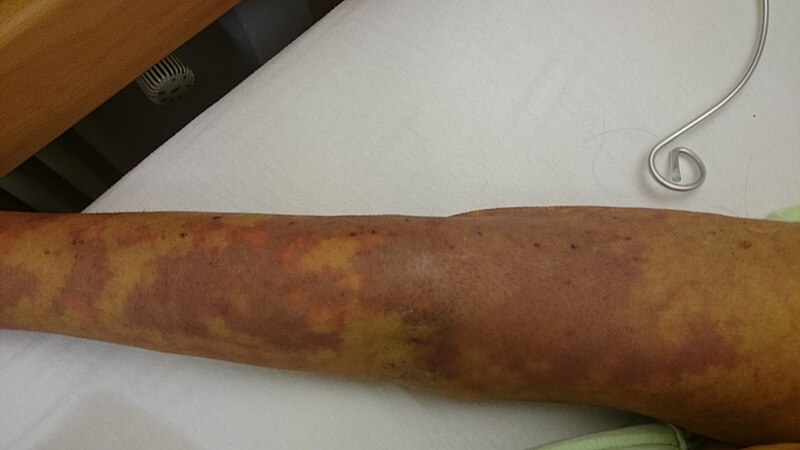
The profound and devastating consequences of misdiagnosing severe infections such as meningitis and sepsis have once again been highlighted by a High Court settlement worth £39 million. The substantial compensation was awarded to a young girl who tragically lost all four limbs due to alleged medical errors during her hospital care.
This case underscores the critical importance of promptly identifying and swiftly treating these rapidly progressing conditions. The girl, whose name has not been disclosed for legal reasons, was admitted to Frimley Park Hospital in Surrey exhibiting symptoms that her lawyers later described as clear “warning signs of meningitis and sepsis.”
These concerning symptoms included a high fever, rapid heartbeat, leg pain, drowsiness, and vomiting. Despite these emergency symptoms, hospital staff reportedly prescribed her paracetamol and discharged her.

However, the girl’s condition did not improve, and her parents, out of concern, rushed her back to the emergency room just a few hours later. It was during this follow-up visit that doctors diagnosed her with meningococcal sepsis, a severe blood infection. The rapid progression of the disease necessitated her transfer to the pediatric intensive care unit of another hospital. There, the infection spread rapidly, leading to multi-organ failure.
Despite multiple medical interventions, including several surgeries (such as skin grafts), doctors were unable to control the severe infection, which caused extensive damage. The infection eventually spread to her limbs, forcing doctors to make the difficult decision to amputate both her legs above the knee and both her arms above the elbow.
Subsequently, the family filed a legal claim against the Frimley Health NHS Foundation Trust. The core claim is that if the girl had received timely antibiotic treatment during her initial visit, she likely would not have suffered such severe consequences and could have avoided undergoing extensive amputations.

The hospital trust ultimately acknowledged responsibility for the incident. This acknowledgment paved the way for settlement negotiations, which ultimately resulted in a settlement agreement reached at the High Court in London.
At the hearing, Sir Caspar Glyn (KC) reviewed the proposed settlement terms.Sir Elizabeth-Anne Gumbel KC, representing the girl and her family, outlined the heartbreaking nature of the case, noting that the plaintiff “unfortunately lost her limbs due to a delayed diagnosis of meningitis.”
Ms. Gumbel also emphasized the physical trauma beyond the amputations, noting that the child had severe scars all over her body.Despite the immense challenges she faces, Ms. Gumbel described her as “an incredibly brave little girl who excels academically at school.”
Bradley Martin, solicitor representing the Frimley Health National Health Service Trust, acknowledged the severity and irreversibility of the girl’s injuries. He stated candidly, “No amount of money can truly compensate her for the harm she has suffered.”

Mr. Martin did emphasize, however, that the agreed settlement would provide crucial resources. He confirmed that the girl “will have access to the care and technology she needs,” suggesting the funds are intended to support her long-term health, independence, and quality of life.
Judge Glyn, in approving the settlement, noted the profound loss experienced by the family. Addressing the girl’s parents, he offered words of solemn understanding: “Money cannot bring who your daughter was back but it can secure her future.
The settlement, totaling approximately £39 million, will be disbursed in a carefully structured manner. It includes an initial lump sum payment designed to address immediate needs and establish necessary care frameworks.

The remainder of the settlement will be paid out in annual installments stretching over the course of the girl’s lifetime. This structure aims to ensure continuous access to necessary care, equipment, and support as her needs evolve.
A letter written by Neil Dardis, Chief Executive of Frimley Health NHS Foundation Trust, was read in court. In this letter, Mr. Dardis issued an apology to the girl’s parents, acknowledging the failings in her care.
He explicitly stated that her care “fell below the standard (the girl) was entitled to expect” and concurred with the family’s contention that she should not have been discharged during her initial hospital visit.
/GettyImages-72470733-58ae6fea5f9b58a3c995f2aa.jpg)
Deborah Nadel, a lawyer from the firm Fieldfisher who represented the girl and her family, provided further context regarding the case and its implications. She strongly asserted that the child’s severe injuries and disabilities were entirely preventable.
Ms. Nadel underscored the presence of unmistakable warning signs. All the red flags for meningitis and sepsis were there for doctors to see,” she stated, pointing to the textbook symptoms the girl displayed upon her first arrival at the hospital.
She stressed the existence of established medical guidelines designed precisely to prevent such outcomes. Specific protocols for treating these illnesses exist to protect patients and doctors, but they only work if they are followed,” Ms. Nadel emphasized, highlighting the alleged failure to adhere to these critical procedures.
Ms. Nadel expressed hope that the financial settlement would provide tangible support for the girl’s future. She explained that the “Settlement will help provide the girl with the equipment, therapy and aids she needs and will help her live her most fulfilling life, despite what happened to her.”

This tragic case is not an isolated incident when considering the perilous nature of delayed diagnosis in critical conditions like meningitis and sepsis. Another poignant story is that of Mia Ginever, a 19-year-old student whose life was also tragically cut short after what her family alleges was a misdiagnosis at Frimley Park Hospital in March 2022.
Mia was taken to the hospital with a severe headache and unusual red spots that did not fade, classic warning signs. Despite these concerning symptoms, she was reportedly told she had a ‘boring’ virus during her first visit and sent home. Her condition deteriorated, prompting a second visit to the hospital with her mother, Mel Ginever. By this point, Mia’s symptoms had worsened to include a stiff neck and delirium.
Her mother recalled the terrifying moments, watching medical staff rush around her daughter. However, it allegedly took five hours for Mia to be properly assessed after arriving for the second time. Crucially, it was only after eight hours had passed since her arrival that blood tests were ordered, which confirmed she had meningitis B. Antibiotics were administered, but tragically, they came too late to halt the aggressive infection.
Mia was placed in an induced coma but succumbed to the illness two days later in intensive care. Her parents were left grappling with the unimaginable loss of a vibrant young woman with plans for the future, including travel and pursuing her dream of becoming an interior designer.

Mia’s father, Phil Ginever, described the level of care his daughter received as “so poor” and spoke movingly of the enduring pain caused by her death. Her mother, Mel, expressed the profound sense of injustice, stating, “Mia’s whole future has been taken away through no fault of her own.”
Mel added, “She had so much to give to the world and was just ready to embrace her life.” The family had trusted medical professionals to make the right decisions, making the outcome even more difficult to bear.
Following Mia’s death, Frimley Health NHS Foundation Trust conducted an internal investigation. This serious incident review reportedly found that Mia was not assessed properly for meningitis and sepsis during her hospital visits.

The review also concluded that the hospital failed to follow the standard NHS protocol, which dictates that antibiotics should be administered within an hour of a patient arriving at the hospital with suspected sepsis, particularly on her second visit. According to the review’s findings, Mia had already developed meningococcal sepsis by the time she was brought to the hospital for the second time. A concerning detail revealed was that a ‘conscious bias’ stemming from the initial alleged misdiagnosis of a viral infection influenced later decisions made by doctors.
An inquest into Mia’s death was opened, seeking to formally establish the circumstances surrounding her passing. Her mother, Mel, later shared on social media that the medical team had described Mia’s case as one of the most severe and fast-acting they had ever encountered.
Mel also beautifully remembered Mia as “quick-witted and the life and soul,” but also cherished her role as a “home bird” who still lived at home with her parents. The family continues to “desperately miss her beautiful smile and infectious laugh every day.”

In a testament to her generous spirit, months before her death, Mia had expressed her wish to be an organ donor. Her organs ultimately helped save the lives of four individuals, offering a small comfort to her grieving parents, who described the recipients as “lucky…to have a part of our precious girl giving them second hope.”
The Ginever family has channeled their grief into action, raising over £46,000 for the Meningitis Research Foundation. Mel and Phil are also actively campaigning for wider availability of the meningitis B vaccine, advocating for age groups who may have missed receiving the jab earlier in life.
Deborah Nadel, the lawyer involved in the young girl’s settlement case, is also representing the Ginever family in an ongoing negligence case related to Mia’s death. She noted the disturbing frequency of such tragedies.

May these narratives serve as a somber reminder that behind every statistic of delayed diagnosis or medical error are individuals whose lives, and the lives of their loved ones, are forever changed. It is in remembering their journeys that we find the imperative to strive for a healthcare system where vigilance prevails and preventable tragedies become stories of the past.
Related posts:
Islanders urged to turn out for 10km ‘Run for Lily’ as young student faces life after quadruple amputation
Teen told she had a ‘boring virus’ by medics before she died of meningitis
Girl secures £39m settlement from hospital trust after meningitis error saw her discharged




